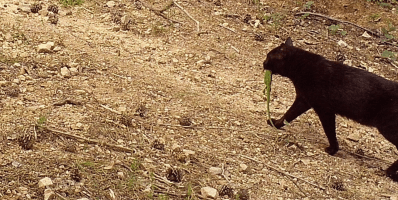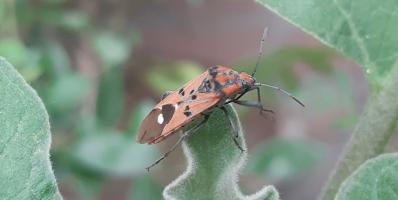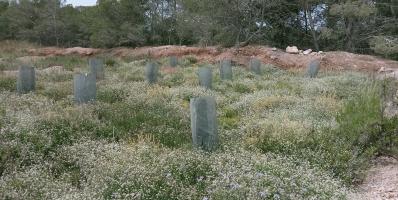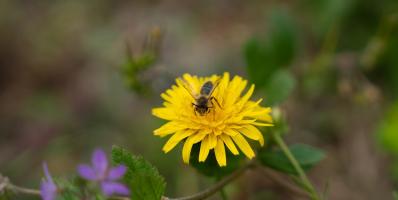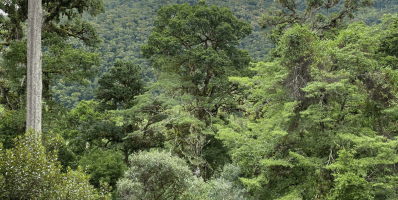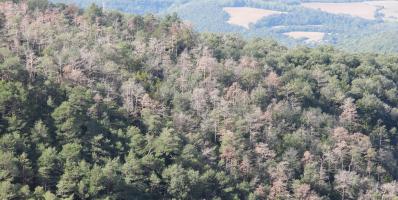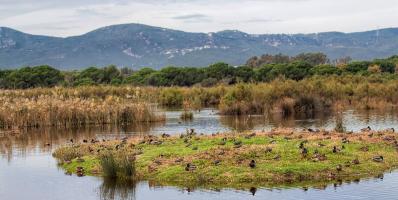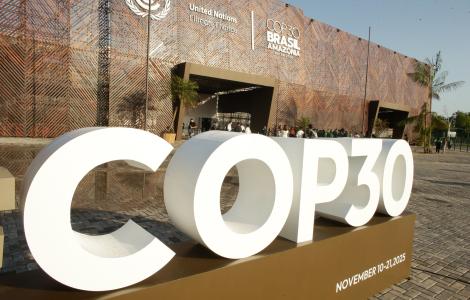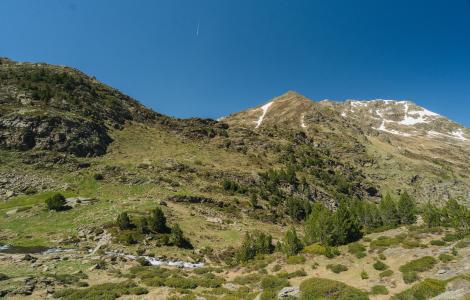Global Change
What potential does nature have to mitigate climate change? Is planting trees a solution? How can we adapt Mediterranean ecosystems to global warming? At CREAF, we investigate how to mitigate the effects of climate change and how to adapt ecosystems with solutions based on nature, such as regenerative agriculture, ecosystem restoration or forest management that includes free dynamics and puts natural processes at the center.
Knowing the biodiversity of the soil helps us to restore and conserve the fertility of the land, on the other hand, the deep knowledge of the forest and its dynamics allows us to collaborate with forest management and fire management, improving prevention and post-fire recovery. We also study invasive exotic species and the effects of urbanization on biodiversity conservation. Thanks to our expertise, climate change models have been improved and adaptation strategies recognized by the IPCC and IPBES have been developed. Our mission is to innovate to improve the resilience of our ecosystems.

Focus areas
- Biological invasions
- Land use change and landscape dynamics
- Climate change
- Fires
- Integrative and adaptive management of water and the territory
- Urbanization and biodiversity
Biological invasions are one of the main components of global change. Through mechanisms such as predation, hybridization or competition, invasive species are a major cause of biodiversity loss, alteration of ecosystems, and biotic homogenization. In addition, they have a strong impact on the health and economy of human societies. At the same time, invasive species provide unique opportunities to understand major evolutionary and ecological processes due to their ability to adapt to new environments and successfully compete with native species.
Not all exotic species arriving to a region become invasive. Only a small fraction of species manage to establish themselves successfully and, of these, only a few are able to increase in numbers and become invasive. Similarly, not all invasive species have an impact on biodiversity, human health or the economy. However, once established, the control or eradication of the species is difficult and the associated economic costs can be huge. For these reasons it is important to emphasise prevention and rapid response mechanisms. In addition to monitoring and regulating routes of entry of invasive species, prevention requires understanding what makes a species a good invader or a region particularly susceptible to invasion.
The main lines of work and experience of CREAF in this field include:
- Database on exotic species: In Catalonia, we collect information on invasive species' biological and ecological characteristics, status of the invasion, the route of introduction, control techniques, and geographical distributions.
- Analysis of the factors associated with the success of the invasion: We study the characteristics that determine a high invasive capacity of species and the factors associated with the vulnerability of the territory to invasions by plants and animals. We also study the influence of humans throughout the different stages of the invasion process.
- Analysis of risk of invasion by certain species: We address this risk by developing and applying invasive species risk prevention protocols.
- Predictive methods and models using citizen science: We combine citizen data with data from official and authoritative sources such as agencies for pest monitoring and control and universities in order to create predictive models of invasive species expansions (in particular, the tiger mosquito).
What have we done?
Landscapes are not static; landcover changes with time due to natural causes but particularly due to human activities. If this is accompanied by a loss, degradation, or fragmentation of habitats, the effects on biodiversity can be especially severe. However, the patterns of species extinctions in these habitats are not yet understood in sufficient detail. For example, there have been delays in species extinctions in receding or declining habitats, and delays in the colonization of new habitats. In fact, these patterns of species extinction and colonization depend on the abundance of individuals and their dispersal ability, but also their interaction with the adjacent landscape which is constantly and quickly changing. Therefore, addressing this problem from a landscape scale and including all social actors in the decision-making process is especially useful for proposing effective management options adapted to the region.
- Analysis with GIS, remote sensing and modelling: We develop new modeling methods for predicting landscape dynamics under different scenarios and incorporating very diverse disturbance regimes; we conduct research on changes in landcover by using long temporal series of satellite images and we improve the processing of the images.
- Effects on biodiversity: We study the possible extinction debts of plants and butterflies in Mediterranean mountain pastures. We analyze patterns of community assembly (of plants and some animal groups) in young forests in the province of Barcelona.
- Effects on ecosystem services at the regional scale: We analyze modifications to the hydrological regimes of Mediterranean river basins. We conduct possible future land use scenarios for some basins in Catalonia.
- Global effects: We study changes in vegetation cover worldwide and relationships with atmospheric chemistry and changes in climate. We study the socio-economic factors promoting deforestation of the tropics and possible solutions to prevent this.
- Reconstruction of past landscapes and environmental conditions: We combine paleolimnology and spatial modeling techniques to make such reconstructions.
What have we done?
Humans are changing the climate. One of the main missions of CREAF is to analyze the impacts of this climatic change on human and natural systems, evaluate vulnerabilities, and study capacities for adaptation and mitigation. We are also interested in understanding how impacts on human and natural systems may have additional repercussions for the climate.
This is undertaken with observations made in the field, with satellites, and with airborne sensors. We also conduct experiments in the laboratory and in the field, and create models based on empirical processes at local, regional, and global scales. The goal of these activities is to analyze and make predictions of the relationships among climate, nature and humans.
- Global-scale studies: We carry out macroecological observational studies over global geographical gradients and coordinate related international scientific networks.
- Climate change simulation experiments: We conduct experiments in mesocosms, greenhouses, pastures, shrublands, and forests where we simulate climate change and nitrogen deposition.
- Community-scale studies: We study the effects of climate change on communities of organisms.
- Ecosystem-scale studies: We study how climate change can alter the productivity and diversity of ecosystems.
- Genetic studies: We study genetic and epigenetic changes of plant species in response to climate change.
- Physiological and demographic mechanisms: We analyze the physiological and demographic mechanisms that determine the responses of microorganisms, flora and fauna to changes in climate.
- Phenology: We study phenological responses to local and regional climate change.
- Ecohydraulic changes: We study the future of water availability in watersheds and basins.
- Biogeochemical cycles: We study alterations of biogeochemical cycles caused by drought and warming, species invasions, and nitrogen deposition.
- VOCs: We analyze the impacts of climate change on biogenic emissions of volatile organic compounds.
- Biophysical and biogeochemical changes: We analyze how biophysical changes and alterations of biogeochemical cycles can affect the climate.
- Extreme events: We study how meteorological variability and extreme events affect ecosystems and society.
- Forests and climate change: We study the vulnerability of forest ecosystems and their associated ecosystem services to climate change. We carry out modeling of the dynamics of plants under different climate scenarios.
- Adaptive forest management: We study the potential of forest management as a tool to reduce the vulnerability of forests to climate change.
- Metabolomics: We measure the impact of climatic changes on organism function worldwide by introducing the omics techniques to ecological field studies. We carry out metabolomic analysis by determination with 1HNMR, HPLC-MS/MS, and 31P NMR.
What have we done?
Fire is a factor that historically has had one of the greatest effects shaping the Mediterranean landscape, but the fire regime has changed in recent decades. During the period of 1960-1990, both the annual number of wildfires as well as the annual burned area increased in an alarming way. After 1990, both variables tended to stabilize, though with many ups and downs, but what has not stopped growing is the appearance of a relatively recent phenomenon: large wildfires. Large wildfires cannot be compared with typical wildfires. Many end up escaping from control of extinction mechanisms, given their rapidity of propagation, virulence, and capacity to create secondary outbreaks and risky situations for human settlements. Also, the regeneration of areas impacted by these wildfires is often much more difficult. The 252 large wildfires which occurred in Spain between 2002 and 2012 cost close to 100 lives and burnt almost 1 million hectares, an area equivalent to the whole province of Lugo (Spain).
As a result of temperature increases due to climate change, in the short term a notable increase in forest fires is expected, in part because forests will also tend to be drier. On the other hand however, high-mountain forests, which are currently wetter and not accustomed to the passing of flames, will probably be those most affected by this disturbance.
- Prevention of forest fire risk: We continually improve the map of daily fire risk and the prioritized protection plans of large forest masses (PPPMs).
- Study and modeling of the fire regime: We analyze the role of forest structure in forest fire and we develop models that allow us to predict vulnerability of the territory to this disturbance and also its long-term effects.
- Forest crown fire and fuel models: We develop fuel maps and models and we analyze why some fires become high-intensity or follow extreme behaviors.
- Fire’s effects on plants: We study survival and regeneration strategies exhibited by the vegetation in response to fires in function of the characteristics of each fire.
- Fauna recovery following wildfire: We analyze the factors which determine the survival and recovery of fauna after fire, as well as their roles as dispersal agents and predators of seed banks.
- Management of burned areas: We evaluate management alternatives which promote reductions in fire risk and favor posterior regeneration, especially in the case of large wildfires.
What have we done?
Climate regulates water availability in the Mediterranean region to a large degree; here the climate is characterized by an accentuated summer drought and seasonal rainfall, with strong inter- and intra-annual variability. Mediterranean ecosystems are limited by these arid conditions, to which is added climate change, recent changes in land use, and other human pressures. As a result, many rivers do not even comply with minimum ecological flow regimes and cannot meet the current demands of ecosystems or society. If we add to the pressures on these river basins the mosaic landscape that characterizes the Mediterranean, we find that many conflicts are being generated between the needs of ecosystems, people and economic actors.
For this reason, we need integrated water and land management to ensure good ecosystem quality and promote responsible use of these resources. Such management must integrate different perspectives and needs and must be designed in a participatory, technologically-open, and integrative manner. Only this way is it possible to deal with conflicts, seek consensual solutions, propose political measures, and create sustainable water management strategies.
The main lines of work and experience of CREAF in this field include:
- Climate change and its impact on water bodies: We study the effects of climate change on water availability for ecosystems and human activities.
- Multidisciplinary and integrated approach to water and land uses: We calculate water budgets considering inputs from the atmosphere and human consumption, taking into account the role of natural systems and different regional planning models.
- Participatory processes for the design of management and planning strategies: We have experience in social participation and dialogue between science and society; this is essential for ensuring an effective implementation of the planned measures.
- Land use change: We evaluate the interaction between land use changes and water availability and demand.
- Identification of social and regional vulnerabilities: We identify the regional ecosystems and human activities which face the greatest risks from impacts of global change.
- Design and implementation of adaptation measures: We design global change adaptation strategies and measures to enhance water availability with attention to social and ecosystem vulnerabilities.
- Management training: We organize courses and on-site visits that promote knowledge and its exchange on adaptive management, territorial analysis, and the involvement of different actors.
- GIS and remote sensing methods and tool development: We carry out spatio-temporal analyses of water resources and monitor and characterize drought and its impacts.
- Standardization and interoperability: We work on the standards and interoperability of formats, data, metadata, services and tools to improve integration of the water sector in a multidisciplinary environment.
What have we done?
Of all of the environmental changes provoked by humans, urbanization is one of the greatest threats to biodiversity. The process of urbanization produces an inversion of landscape patterns which become dominated by anthropic habitats. This entails a reduction and fragmentation of natural habitats, and the emergence of strong barrier effects that hinder or even prevent the movement of organisms and ecological connectivity. In addition, food sources become more artificial, disturbances increase, and different types of pollution including chemical, light and sound become more frequent.
These changes have important implications for natural communities, the most prominent of which are the reduction of the phylogenetic and functional diversity, the creation of more homogeneous communities dominated by a few anthrpophilic species, and the proliferation of invasive species. Despite the serious nature of these impacts, the consequences of urbanisation for organisms and natural systems are poorly understood. Considering that urban land use is expected to increase by 1.2 million km2 during the first third of this century, understanding the impact of the urbanization process on biodiversity is one of the main priorities for preserving the functioning of natural systems and the services they provide, keeping in mind that human wellbeing also depends on these.
The main lines of work and experience of CREAF in this field include:
- Analysis of the causes of biodiversity loss: Although most species do not seem to tolerate the environmental changes associated with urbanization, some seem to perceive these changes as ecological opportunities. We study what makes some species more tolerant than others in order to anticipate how urbanization will reduce the phylogenetic and functional diversity of ecosystems.
- Analysis of changes in the patterns of community construction: Urbanization implies substantial changes in the composition of communities of organisms, with a progressive extinction of specialists and a proliferation of generalists. Proximity to urban areas also leads to an increased risk of invasion by exotic species due their abundance and frequent disturbances which favor their establishment in natural habitats. We study how the taxonomic, functional and phylogenetic diversity of natural communities is altered by extinctions and colonizations associated with urbanization.





